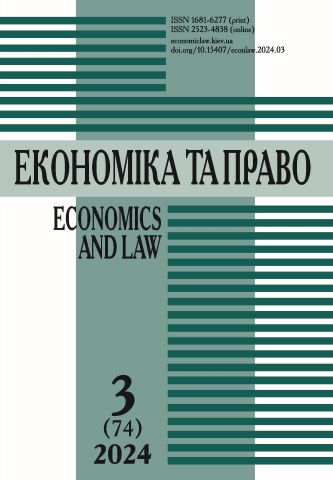VIEWS ON THE CONCEPT AND PURPOSE OF LICENSING OF ECONOMIC ACTIVITIES
DOI:
https://doi.org/10.15407/econlaw.2024.03.093Keywords:
licensing, economic activity, licence, economic entity, means of regulatory influence of the state, administrative procedure, legitimation of an economic entity, permit, licensed activity, quality products.Abstract
The purpose of the article is to provide definitions of the concepts of “licensing” and “licence” and to identify the main purpose of licensing of economic activities with a view to further clarifying the relevant regulatory framework. Research methods. To achieve this goal, the article uses the following research methods: comparative legal, legal and legal, analytical and synthetic, systemic and structural, and others. Results. The article provides the doctrinal definitions of the concepts of “licensing” and “licence” formulated by various legal scholars, as well as the legal definitions of these concepts provided in the General Law of Ukraine “On Licensing of Economic Activities” and special laws on various types of economic activities. Licensing is an integrated concept, defined through actions, activities, legal relations, obtaining permits, procedures, goals and objectives, etc. Often, licensing is recognised as a set of actions of authorised state authorities, a criterion or factor of compliance of an economic entity with certain conditions and characteristics, a means of state regulation of economic activity, etc. Accordingly, a licence is most often recognised as a permit or an act or document. The diversity and multi-vector nature of the definition of the very concept of licensing is due to the genesis of the licensing process for economic activities in Ukraine; interpretation of licensing due to its mixed nature as a means of regulatory influence of the State on the activities of economic entities or as an administrative procedure, or as a permit or right to carry out a certain type of activity, or as a means of legitimisation of economic entities, etc. Based on the diversity of the concepts of “licensing” and “licence”, the author outlines their characteristic features. The purpose of licensing is to use it as a way to legitimise economic entities or as a mandatory way to establish a certain type of economic entity, as an administrative procedure with the licence itself being recognised as a permit to carry out a certain type of economic activity. However, the most important or main purpose of licensing is to be used as a means of regulatory influence of the state on the activities of economic entities. The main purpose of licensing is to regulate by the state the manufacture of quality products, sale of quality goods, performance of quality works and provision of quality services. It is in this direction that amendments and additions to licensing legislation should be implemented.
References
Biletska L.M. Hospodarsko-pravove urehuliuvannia strakhovoi diialnosti v umovakh yii didzhytal-transformatsii.
Dictum factum. 2023. No. 1 (13). P. 39-45 [in Ukrainian].
Derevianko B.V., Rodina V.V. Do mekhanizmu strakhuvannia zhyttia i zdorovia pasazhyriv pry perevezenniakh
miskym elektrychnym transportom. Visnyk Donetskoho natsionalnoho universytetu, Ser. V: Ekonomika i pravo. 2010.
Iss. 2, Vol. 2. P. 615-621. URL: https://repository.ndippp.gov.ua/handle/765432198/302 [in Ukrainian].
Duma V.V. Strakhova diialnist v umovakh rosiiskoi ahresii: pravovi pidstavy y praktychni perspektyvy. Yurydychnyi
visnyk. 2022. No. 2 (63). P. 160-166 [in Ukrainian].
Karpenko K.K. Istorychna retrospektyva formuvannia ta rozvytku strakhuvannia nazemnykh transportnykh za-
sobiv v Ukraini. Visnyk Luhanskoho derzhavnoho universytetu vnutrishnikh sprav imeni E.O. Didorenka. 2017.
Iss. 1 (77). Vol. 1. P. 142-151 [in Ukrainian].
Nechyporenko A.V. Derzhavne rehuliuvannia strakhovoi diialnosti v Ukraini: teoretychnyi aspekt. Efektyvna
ekonomika. 2021. No. 7. https://doi.org/ 10.32702/2307-2105-2021.7.94 [in Ukrainian].
Patsuriia N.B., Voitsekhovska I.M., Holovachova A.S. Pravove rehuliuvannia diialnosti u sferi strakhuvannia ta
perestrakhuvannia: problemy teorii ta praktyky. Kyiv: Lira-K, 2017. 256 p. [in Ukrainian].
Stas E.P. Hospodarsko-pravove zabezpechennia strakhuvannia pidpryiemnytskykh ryzykiv: avtoref. dys. ... kand.
yuryd. nauk: 12.00.04. Odesa, 2012. 20 p. [in Ukrainian].
Uralova Yu.P. Hospodarsko-pravove rehuliuvannia poserednytskoi diialnosti u sferi strakhuvannia. Vinnytsia:
TVORY, 2019. 164 p. [in Ukrainian].
Shcherbyna V.S., Bodnar T.V. Nahliadova rada aktsionernoho tovarystva: poriadok stvorennia, sklad ta povno-
vazhennia. Yurydychnyi naukovyi elektronnyi zhurnal. 2024. No. 3. P. 230-233 [in Ukrainian].
Zyskind I.O. Hospodarsko-pravovyi aspekt rehuliuvannia ta nahliadu (kontroliu) u sferi strakhuvannia: dosvid
Ukrainy ta zarubizhnykh krain: avtoref. dys. ... kand. yuryd. nauk. Odesa, 2011. 20 p. [in Ukrainian].
Khozyaystvennyy kodeks Ukrainy: Nauch.-prakt. komment. Pod obshch. red. A.G. Bobkovoy. Kharkiv: Izd. FL-P
Vapnyarchuk N.N., 2008. 1296 p. [in russian]. https://doi.org/10.1055/s-0028-1087319
Tokareva V.O. Strakhuvannia predmetiv mystetstva. Aktualni problemy derzhavy i prava. 2009. Iss. 51. P. 320-325
[in Ukrainian].
Adamova O.S. Dohovir morskoho kruizu. Aktualni problemy derzhavy i prava. 2009. Iss. 51. P. 258-263 [in Ukrainian].
Zaiets O.M. Prymusove ukladannia dohovoriv strakhuvannia — hrube porushennia zakonodavstva Ukrainy.
Visnyk Luhanskoho derzhavnoho universytetu vnutrishnikh sprav imeni E.O. Didorenka. 2011. Iss. 4 (57). P. 123-128 [in Ukrainian].


